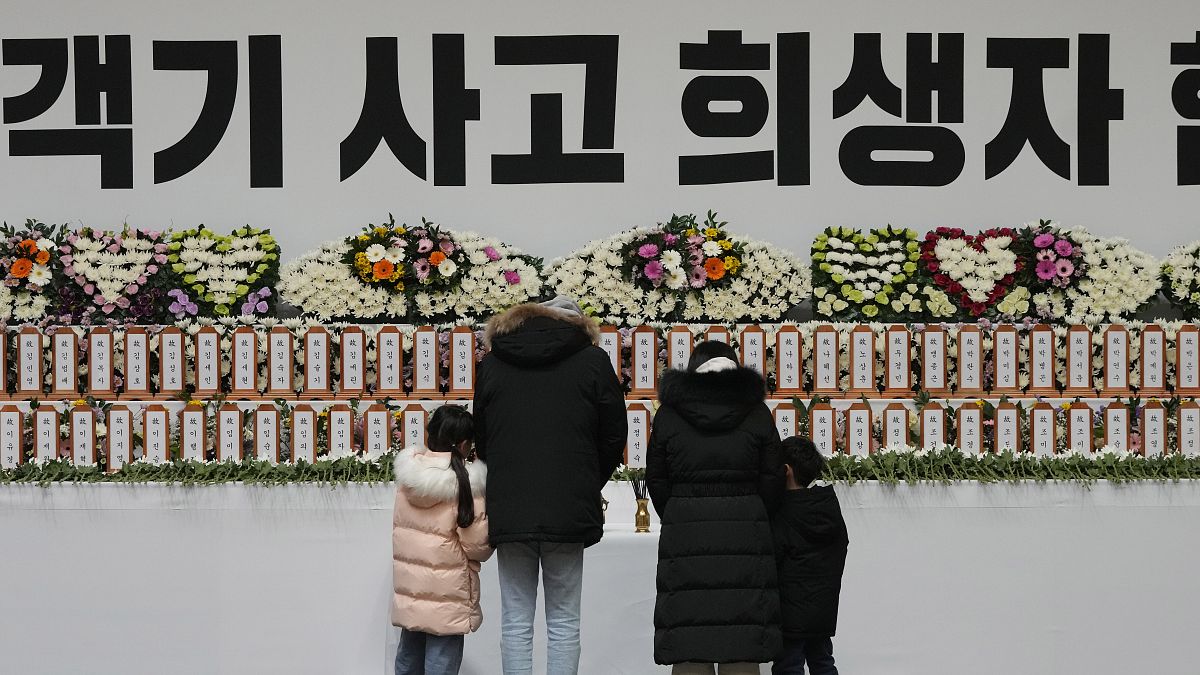The Jeju Air passenger plane crashed into a wall and burst into flames after skidding off the runway at Muan airport on Sunday when its landing gear apparently failed to deploy.
People have laid flowers at a memorial centre that has been setup in the southern South Korean city of Muan to remember the 179 people killed when a passenger plane crashed at the airport on Sunday.
The Jeju Air passenger plane crashed into a wall and burst into flames after skidding off the runway at Muan airport when its landing gear apparently failed to deploy.
The Transport Ministry said the plane was a Boeing 737-800 jet that was returning from Bangkok.
Yonhap News Agency said on Monday that Seoul has ordered an inspection of all those Boeing aircraft models in the country following the disaster.
And in a briefing for family members, officials said that the 141 of the 1979 victims have been tentatively identified with all bodies moved to a temporary morgue.
At a press conference at Muan International Airport, officials from the Ministry of Land, Infrastructure and Transport told reporters that the Jeju Air pilot contacted air traffic control to report the plane had suffered a bird strike and declared a mayday shortly before the crash.
Kang Jung-hyun said the control tower had already warned the jet about “bird activity” in the area.
“If there had been more time, they could have requested preparation measures, such as dispatching fire trucks to standby and preparing for an emergency landing. Typically, in such cases, the pilot makes these requests, and the control tower coordinates by placing firefighting teams on standby,” he said.
Footage of the crash aired by South Korean television channels showed the Jeju Air plane skidding across the airstrip at high speed, apparently with its landing gear still up, overrunning the runway and colliding with a concrete wall on the outskirts of the facility, triggering an explosion.
Other local TV stations aired footage showing thick plumes of black smoke billowing from the plane, which was engulfed in flames.
Lee Jeong-hyeon, chief of the Muan fire station, told a televised briefing that the plane was completely destroyed, with only the tail assembly remaining recognizable among the wreckage. Lee said that workers were looking into various possibilities about what caused the crash, including whether the aircraft was struck by birds, Lee said.
Senior Transport Ministry official Joo Jong-wan said workers have retrieved the flight data and cockpit voice recorders of the plane’s black box, which will be examined by government experts investigating the cause of the crash and fire.
Joo said the runway at the Muan airport will be closed until 1 January.
The Transport Ministry said the plane’s passengers include two Thai nationals. Thailand’s prime minister, Paetongtarn Shinawatra, expressed condolences to the families of those affected by the accident in a post on X.
Kerati Kijmanawat, the director of Airports of Thailand, confirmed in a statement that Jeju Air flight 7C 2216 departed from Suvarnabhumi Airport with no reports of abnormal conditions with the aircraft or on the runway.
Jeju Air in a statement expressed its “deep apology” over the crash and said it will do its “utmost to manage the aftermath of the accident.”
In a televised news conference, Kim E-bae, Jeju Air’s president, bowed deeply with other senior company officials as he apologized to bereaved families and said he feels “full responsibility” for the incident.
Kim said the company hadn’t identified any mechanical problems with the aircraft following regular checkups and that he would wait for the results of government investigations into the cause of the incident.
Boeing said in a statement on X it was in contact with Jeju Air and is ready to support the company in dealing with the crash.
“We extend our deepest condolences to the families who lost loved ones, and our thoughts remain with the passengers and crew,” Boeing said.
It’s the deadliest air disaster to ever happen on South Korean soil.
The last time the country suffered a large-scale air disaster was in 1997, when a Korean Airline plane crashed in Guam, killing 228 people on board.
And in 2013, an Asiana Airlines plane crash-landed in San Francisco, killing three and injuring approximately 200.
Read the full article here
